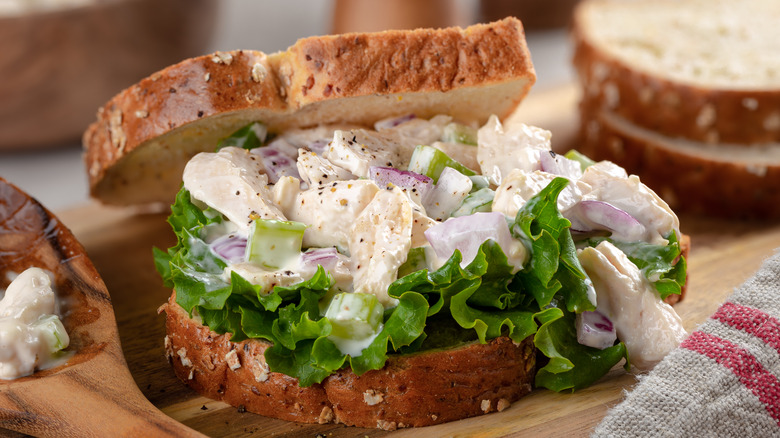Everything You Want To Know About Albertsons' Chicken Salad Recall
It hasn't been a good few years for chicken salad, which has been subject to multiple recalls. In August 2021, Willow Tree recalled 26 tons of chicken salad due to potential plastic contaminates (per Food Safety News). Similarly, plastic pieces were found in Trader Joe's Crunchy Slaw with chicken, crispy noodles, and peanut dressing in March, per Food Safety News.
Unfortunately, there's another chicken salad recall that has shoppers throwing away or returning their pre-made chicken salad to stores where they were initially sold, including Albertsons and Safeway, due to possible nut contamination.
The chicken salad sandwiches in question are the ReadyMeals Chicken Salad Quad and the Chicken Salad Sandwich Club 18 Inch Tray, the latter a platter of pre-made chicken salad sandwiches. The recall comes after the discovery that the chicken salad may contain cashew, a tree nut and allergen, after a customer had an allergic reaction, explains the FDA.
Throw away or return your Albertsons or Safeway chicken salad
The ReadyMeals Chicken Salad Quad comes served in a 12-ounce, four-compartment plastic container along with grapes and carrots with a UPC code of 21352400000 and is priced at $5. The Chicken Salad Sandwich Club Tray comes on a black tray with 18 sandwiches on it and has a UPC code of 29615900000. It costs $44.99.
Both products have sell-by dates through October 20th and were sold at both Albertsons and Safeway stores in Colorado, Nebraska, New Mexico, South Dakota, and Wyoming, per the FDA.
The FDA is encouraging those who may be having an allergic reaction and may have eaten the chicken salad to find healthcare immediately, as consuming tree nuts can be deadly for some people. Healthline states that symptoms of a cashew allergy generally emerge immediately after consumption and might include stomach pain, vomiting, diarrhea, shortness of breath, trouble swallowing, and, in severe cases, anaphylaxis. Those who are allergic to other tree nuts, such as almonds and walnuts, have a higher chance of developing a cashew allergy.

